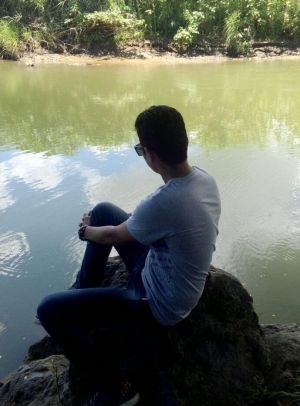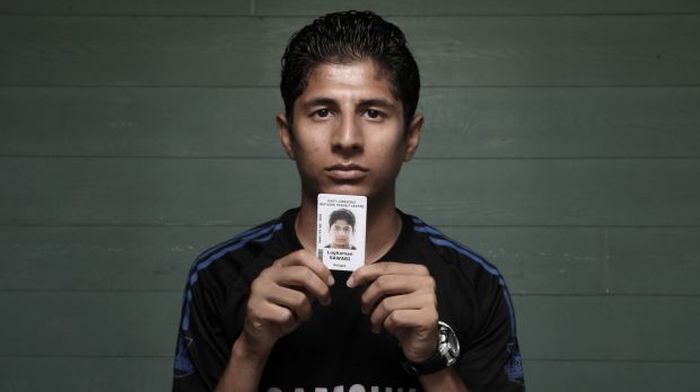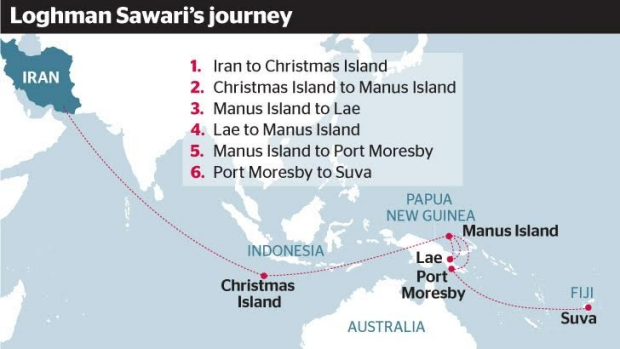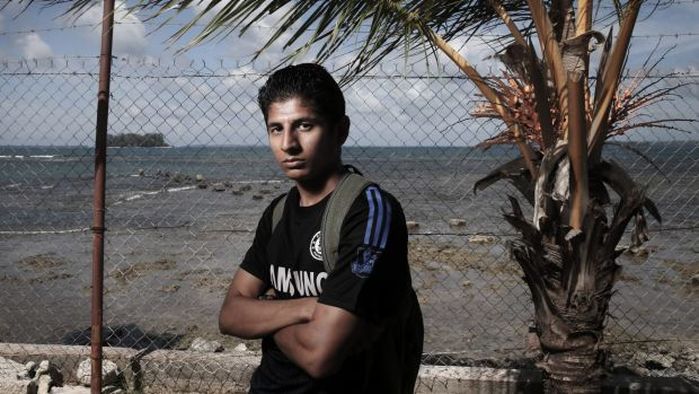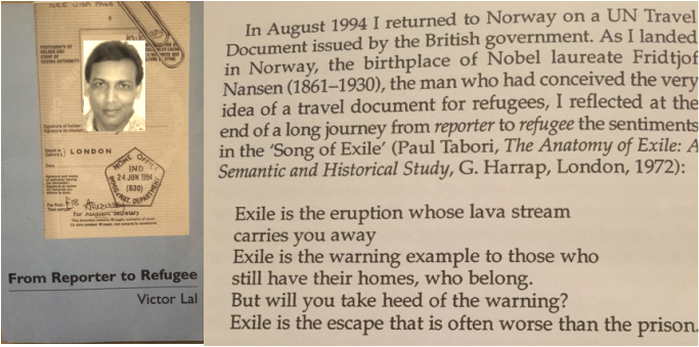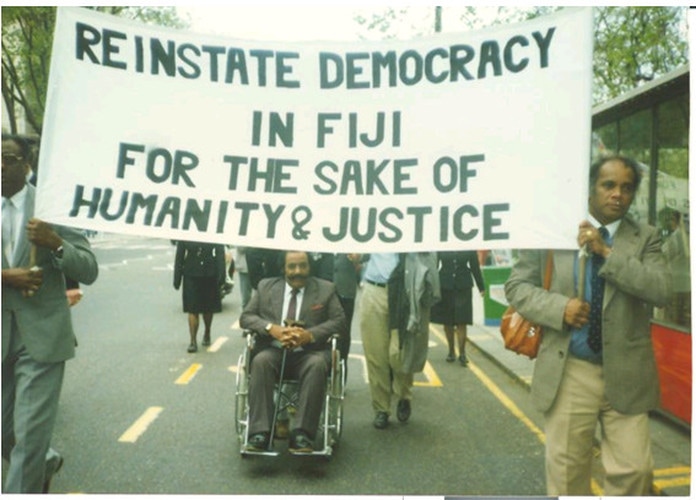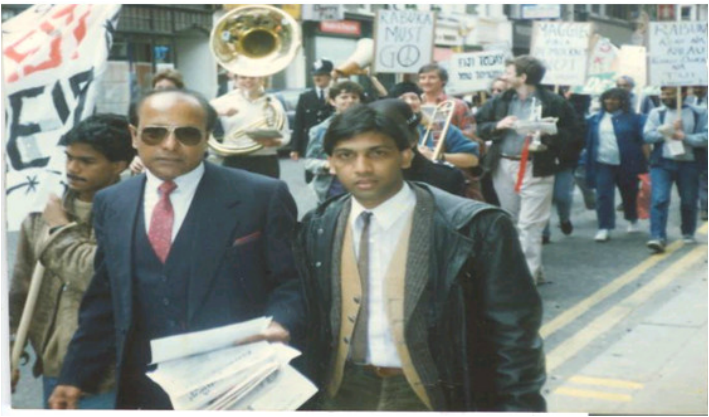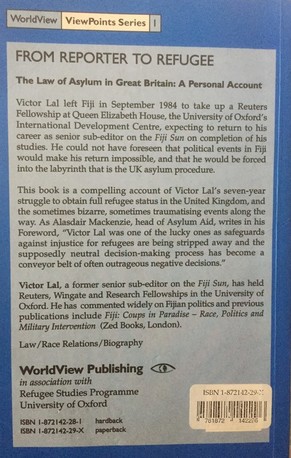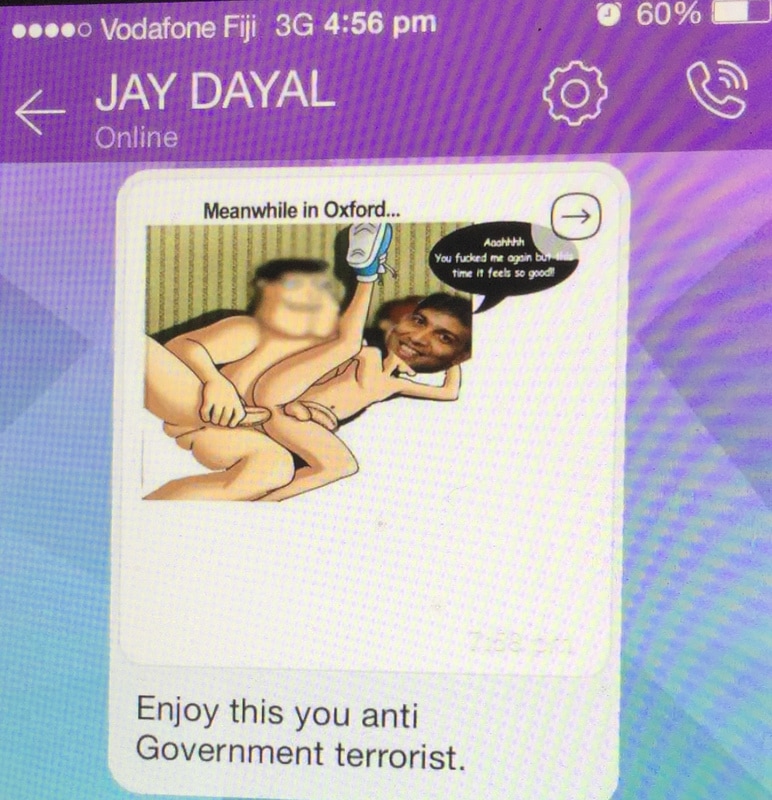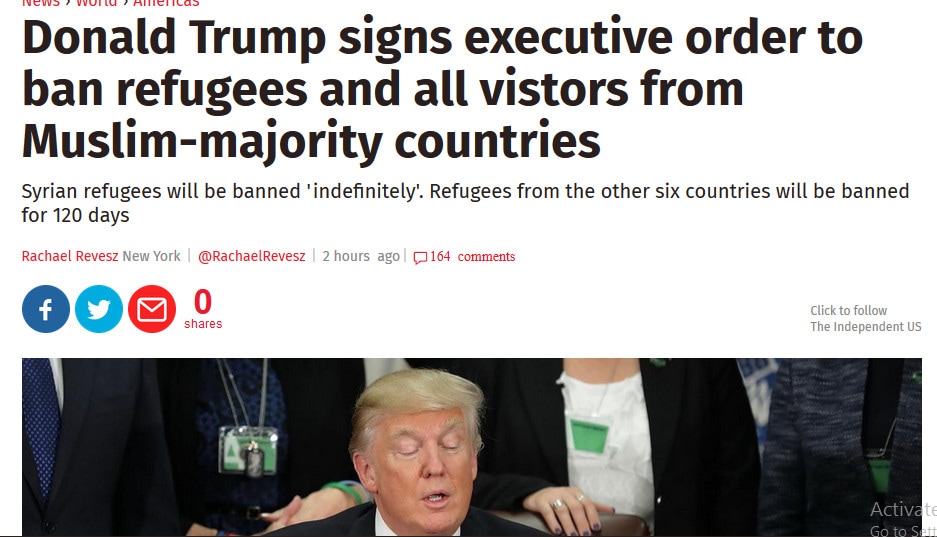And for Fiji Immigration authorities to explain to us how he got into Fiji? Broke and destitute, the young Iranian asylum seeker Logham Sawari has been given refuge by a Fijian family and is planning to present himself to Fiji immigration officials on Monday to seek protection
"Hopelessness and living in constant fear [in PNG] is leading him to consider drastic action. I also believe that his mental health is declining and is at a point where he needs to be given the support and safety very soon. I am very concerned for him. He is exhausted and I believe he is unable to continue. I also believe he will make some decisions that will see him either lose his life or at least end up more damaged."
Trauma worker Janet Galbraith to the UNHCR
WE must remember thousands of Indo-Fijians (many not even politically active) fled Fiji with or without their families from RACIST SITIVENI RABUKA and India even secretly gave deposed Prime Minister Mahendra Pal Chaudhry $2million to relocate to Australia with his family following the George Speight failed coup, and Ratu Tevita Mara fled to Tonga in a daring escape from Aiyaz Khaiyum and Frank Bainimarama, not to mention many native Fijians who fled abroad following the 2006 coup
"We may well entertain a vision of a world without refugees - a world in which men and women are never in jeopardy on account of their religion, their nationality, their political views, or their membership of any group, of a world in which people need never flee from war and civil strife. But this is not the sort of world in which we live. We can so easily be seized by despair or cynicism, by the wish to cultivate our own garden and to be sufficient unto ourselves. In the years that lie ahead, too, we shall encounter men and women on the run. It is beyond the capacity of mankind to predict where and when new refugee problems will arise. But we possess the fundamental ideas on human rights and a sense of fellow feeling that goes beyond countries and continents, religions, cultures, and racial borders. We live in a world community of states, as reflected in the United Nations. But we are living, too, in the world community of men and women - many of them men and women who are stateless..."
The Norwegian Nobel Committee while awarding the Nobel Peace Prize for 1981 to the Office of the United Nations High Commissioner for Refugees
Escape from Manus Island: Iranian refugee seeks asylum in Fiji
By Michel Gordon, Sydney Morning Herald, 28 January 2017
It is the first case where a refugee who sought asylum from Australia is claiming to be fleeing persecution by a country connected to the Coalition's deliberately harsh "stop the boats" policy.
Mr Sawari told Fairfax Media he had cobbled together the money for the airfare from several sources over several months.
Broke and destitute, he has been given refuge by a Fijian family and is planning to present himself to Fiji immigration officials on Monday to seek protection.
UNHCR officials are understood to be aware of his situation, which poses legal and diplomatic challenges for the countries involved. Fiji, PNG and Australia are all signatories to the refugee convention.
A warning that Mr Sawari could take extreme measures was included in a submission from trauma worker Janet Galbraith 10 weeks ago. The submission requested he be included in the proposed US resettlement deal because of his vulnerability.
"Hopelessness and living in constant fear is leading him to consider drastic action. I also believe that his mental health is declining and is at a point where he needs to be given the support and safety very soon," Ms Galbraith wrote to the UNHCR.
"I am very concerned for him. He is exhausted and I believe he is unable to continue. I also believe he will make some decisions that will see him either lose his life or at least end up more damaged."
Mr Sawari said he is terrified of being sent back to PNG. "If I go back they will make me crazy or they put me in the jail. I'm sure about that," he said by phone from Nadi.
"My problem is I cannot go back to Iran and I can't stay in PNG. I don't want to go to Australia. I just want to be free, just like human being. I would stay in Fiji. Here you can walk anytime - night, morning. You free here."
Ms Galbraith has just returned from three months in PNG and said Mr Sawari is more vulnerable than many others on Manus Island because his teenage years were filled with trauma and torture in Iran before his ordeal on Manus Island.
For the first few months of his detention in Papua New Guinea, Mr Sawari was an aberration: the boy in a detention centre that was supposed to be exclusively for men, a number of whom have wives and children in Australia.
He was 17 when he arrived on Manus Island in August 2013, one month after the then Labor government decided to remove children and family groups from the detention centre. A letter from Australian immigration officials told him he would be "treated as a minor for the purposes of accommodation, placement and other purposes". He remained in isolation until his 18th birthday, when he was told he would be staying.
He was one of the first refugees to be leave the detention centre on Manus Island after his claim for refugee status was accepted, but he suffered from depression and was taken to the local jail after attempting suicide soon after his release. Case notes dated January 2014 show that Mr Sawari was considered to be "high risk".
He lasted two months in PNG's second-biggest city, where he said he was terrified by an armed "raskol" and reduced to tears by bullying in the town before being befriended by a homeless youth.
After being refused permission to return to the transit centre, Mr Sawari fled on a boat and was protected by locals on a neighbouring island for some weeks before returning to Manus Island and being transferred to Port Moresby.
In Port Moresby, Ms Galbraith's report notes Mr Sawari continued to experience harassment, bullying and attacks. "He is extremely and obviously hyper-vigilant all the time. He seldom sleeps and often spends a week inside his unit as he is afraid to venture out."
Ms Galbraith said she had no warning of Mr Sawari's intentions, but had counselled him against previous escape plans, which included travelling by boat to the Solomon Islands.
"In PNG, many of the refugees are talking about doing this. He's just the first who has succeeded. It's not that others haven't tried."
He has also suffered from chronic dental problems, recurring infections in his ears, gums, throat and stomach since 2013 and bouts of fainting and dizziness.
His voice sounded excited and hopeful when he spoke to Fairfax Media soon after arriving in Fiji.
But the excitement had given way to anxiety, uncertainty and dread on Friday.
"Today I'm not really OK because I'm thinking too much what will happen." Source: The Sydney Morning Herald, 29 January 2017
When we asked for Indo-Fijian rights, Sitiveni Rabuka through his illegal decrees and native Fijian lawyers in 1987 called me and others "TERRORISTS" who were plotting to overthrow him through the smuggled "GUNS OF LAUTOKA" - Victor Lal, 29 January 2017;
"An Opponent of a Dictator is an Enemy of the State", whether it is
in Fiji or Iran. So, let us give this young Iranian asylum seeker the opportunity to prove his claim for asylum in Fiji, and not speak the despicable Donald Trump language against all MUSLIMS. Rabuka had branded all Hindus and Muslims as PAGANS who should be converted to Christianity. It was a matter of Sink or Swim with Indo-Fijians in Fiji
The characters might have changed in Fiji but the language "anti-government terrorist" was still rife as late as last year - 2016:
Friedrich Trump, a German, was issued with the document in February 1905, and ordered to leave the kingdom of Bavaria within eight weeks as punishment for having failed to do mandatory military service and failing to give authorities notice of his departure to the US when he first emigrated in 1885.
Roland Paul, a historian from Rhineland-Palatinate who found the document in local archives, told the tabloid Bild: “Friedrich Trump emigrated from Germany to the USA in 1885. However, he failed to de-register from his homeland and had not carried out his military service, which is why the authorities rejected his attempt at repatriation.”
The decree orders the “American citizen and pensioner Friedrich Trump” to leave the area “at the very latest on 1 May ... or else expect to be deported”. Bild called the archive find an “unspectacular piece of paper”, that had nevertheless “changed world history”.
Trump was born in Kallstadt, now in the state of Rhineland-Palatinate, in 1869. He emigrated to the US aged 16 initially to escape poverty, attracted by the gold rush.He quickly turned his attention to catering for the masses of other gold hunters in Alaska, later allegedly running a brothel for them, and there made his fortune. He habitually sent the gold nuggets with which his customers regularly paid for their food to his sisters who had already emigrated to New York and had started trading in property.
Returning on a visit to Kallstadt in 1901, Trump fell in love with Elisabeth Christ, whom he married a year later, returning with her to the US. But when she became homesick and wanted to return to Germany, the authorities blocked his attempts to settle there.
In an effort to overturn the royal decree dated 27 February 1905, Trump wrote an obsequious letter appealing to Prince Regent Luitpold, addressing him as “the much-loved, noble, wise and righteous sovereign and sublime ruler”.
But the prince rejected the appeal and the Trumps left Germany for New York with their daughter on the Hapag steamship Pennsylvania on 1 July 1905. Elisabeth was three months pregnant with Donald Trump’s father, Fred.
Residents of Kallstadt, a small wine-growing town of about 1,200 people in south-west Germany, joke that the blame for Trump becoming US president-elect lies with the German authorities who threw his grandfather out. They have so far shown little enthusiasm for claiming the businessman turned politician as their own.
